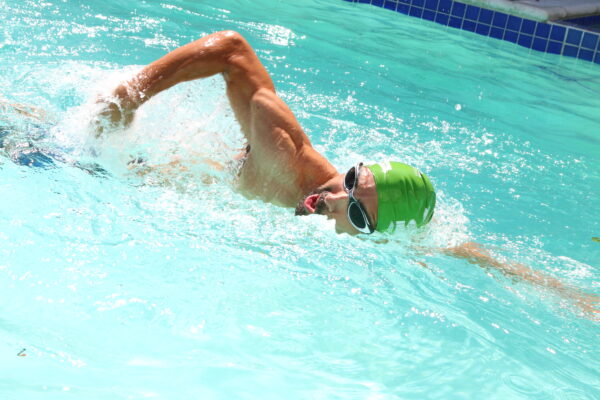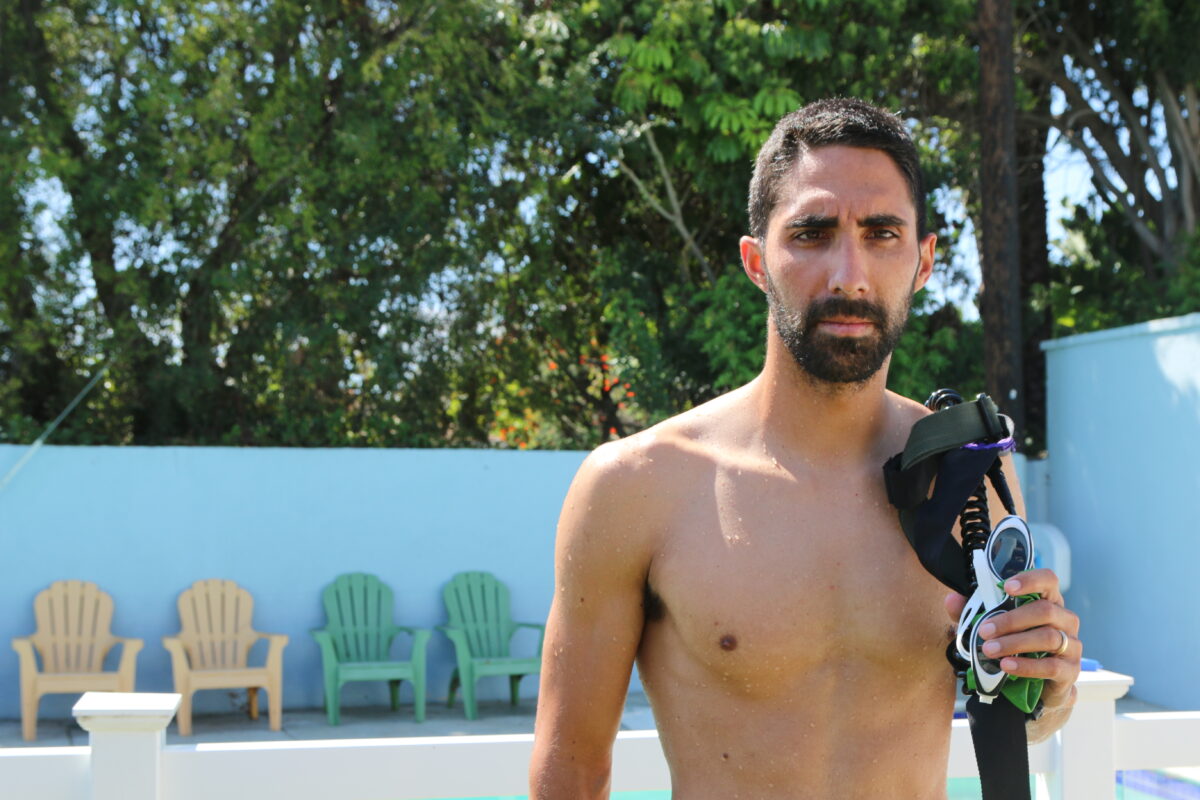Blind tri: Former Marine Steve Walker participates in Ironman World Championships despite blindness

Triathlete Steve Walker with the harness he uses to keep connected to his race guide Chris Foster. Photo
Steve Walker learned he was going blind in 2001.
He was 18 years old, a year out of high school and celebrating his first year in the United States Marine Corps.
“My eyes were sensitive in the dark, and I had difficulty seeing in the field,” Walker, now 33, said. He was moving slower and his reaction times dropped, as did his scores on weapons qualification exams. He couldn’t hit targets at all during night exercises.
“But it wasn’t really a big deal because I was able to push through, pass tests, and not raise any flags.”
Then a routine eye exam revealed he suffered from retinitis pigmentosa, a genetic disorder that affects the retina’s ability to respond to light. “It starts from the outside and moves in,” Walker said. After losing his night vision, his peripheral vision began to go.
Now, he’s blind in his right eye. Vision in his left eye has diminished to the point it’s like looking through a straw. He and his wife Kacey know that one day his sight will be gone for good.
Nonetheless, on October 10, Walker will compete with the world’s greatest athletes in the 2015 Ironman World Championship in Hawaii.
Walker was born in San Diego and raised in Redondo Beach. He lives just down the street from his old home and old schools, near Beryl and Prospect.
He and Kacey met in high school. He was 15, she was 14. The two married shortly after high school.
Becoming a Marine became a goal when he joined the Parras Middle School JROTC and continued through the Redondo Union High JROTC program.

Steve Walker and his daughter Jordan at his home gym. Photo
“I have a high admiration and a love for the other branches,” he said, “but among Marines there’s a discipline and eye for detail and a way they carry themselves both in the U.S. and overseas in a war-zone that’s slightly more elevated.”
“What is it that you hear about MIT and Harvard? People go, ‘is it really that special?’ and I found that it is,” he said.
He tattooed the German translation for “Devil Dog” on his left wrist “so people would have to ask for the meaning.”
After leaving the Marines, he worked in real estate for five years, having grown up around the mortgage industry. Then he went back to school to earn a degree in psychology, spending time at El Camino before transferring to Cal State Dominguez Hills.
After a series of minor car accidents, he gave up his license. “Normally, when someone cuts you off, you tap the brakes to slow down. But when someone would cut me off, because I didn’t have peripheral vision, I couldn’t tell.”
As RP began to take his eyesight, the loss began to weigh heavier and heavier on his shoulders.
In 2013, when he was at an emotional low, he and his wife were in San Diego helping a long-time friend from high school, Joe McLaughlin, move into an apartment. Laughlin had been doing triathlons and encouraged Walker to try the sport.
Cycling was where it began. “It was an ego thing,” Walker said. “I didn’t want to ride a tandem with another guy, but it didn’t take too long before it just clicked.”
Climbing and bombing the hills of Palos Verdes, hitting 30 to 50 m.p.h. made him feel like he was behind the wheel of a car again. The fact that he wasn’t quite able to see made him feel like he was riding by himself, “even with another grown man sitting in front of me,” he said.
Cycling spurred him to assess his other skills. Running came naturally. Six-minute miles were “no big deal,” he said.
Swimming, however, was a problem. Despite growing up near the ocean, Walker was never comfortable in the water.
“He had to take breaks after every 25-yard lap,” said Dr. Carl Feld, one of Walker’s first swim “pilots.” The two met through a site that matches visually impaired athletes with training partners. They worked out together at the Plunge in Torrance.
But Feld knew he wasn’t an optimal competition partner for Walker. That’s where Chris Foster came in.
Foster, as Walker puts it, is a “freak of nature.” He’s a professional triathlete, a cross country coach and a columnist for numerous athletic-interest magazines. “He could run 20 miles in two hours and wake up with no aches or pains the next morning,” Walker said. “You want your guide to be faster than the athlete. You don’t want the guide to set the limit.”
“It’s difficult finding a pilot for the tandem,” Walker said. “You see all of the cyclists around here, but everybody is nervous that they’ll hurt me or they’ll say it’s too difficult to ride.” That’s not the case with Foster.
Walker and Foster were at the recent Paracycling National Championships, riding what Foster called a “thin course in the woodsy part of Chattanooga,” when they were slowed down by a flat tire. Foster knew they had to make up ground, quickly.
“I was taking turns really hard, but a tandem isn’t built for taking turns hard. I was putting Steve into the branches of trees off the side of the road, but he didn’t say anything.”
After the race, Foster began apologizing when Walker waved him off.
“I was just excited that you were pushing it so hard,” Walker told him.
“I would’ve been screaming, but it fired him up — that was a cool thing, the trust and faith he had, how badly he wanted to win,” Foster said.

Walker swims against the Endless Pool current in his backyard swimming pool. Photo
Now that the two are in the final stages of training for the Ironman, the recent humid weather has been a plus. Walker moved his home training setup (a treadmill and tandem cycle, mounted on a resistance trainer) outside to help prepare for Hawaii’s tropical conditions. The recent addition of an Endless Pool swimming machine, which creates a resistance current, in Walker’s backyard will help improve his open water swimming, Walker hopes.
“The open water fear that he’s experienced is relatively common among triathletes,” Foster said. “But even in just the last three or four swims, he’s gotten way more comfortable. ”
This will be Walker’s second Ironman. He celebrated completion of last year’s Cozumel Ironman with a tattoo of the race’s coordinates.
He’s not sure what’s after Hawaii.
He’s hoping to run a qualifying time for next year’s Boston Marathon and he’s hoping to improve his cycling skills sufficiently to compete in the 2016 Paralympic Games in Rio de Janeiro.
“I’m always trying to get better, trying to beat these other blind guys on the tandem,” he said.
Note: Walker completed the Ironman World Championship race with a time of 14 hours, 36 minutes and 37 seconds, earning him a ranking of fourth in his division, and 1903 overall.


